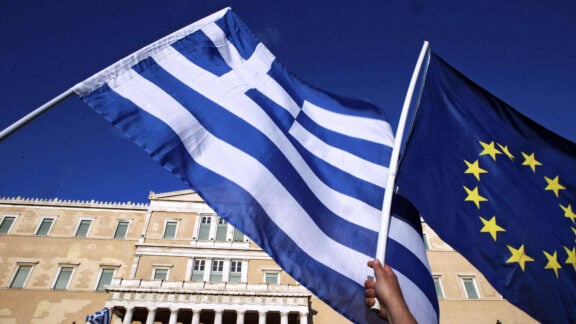His name is well known: a much-discussed, globally-recognised individual who has entered all our lives. Calm, measured, polite, but also determined to talk about the “failings” of Europe, Yanis Varoufakis prompted me to ask whatever I wished regarding the dramatic events in Greece over the last six months, from his rise to resignation as finance minister.
“When you enter a government as finance minister in a country that is virtually bankrupt; when you’re dealing with very tough opponents who control the state and its finances and your goal is to come into conflict with them, it’s not easy,” he says.
“It was a life that no one could withstand for more than a week.”
I ask him about his motivations for the role. Does he regret in any way his decision to support the SYRIZA government and assist Alexis Tsipras’ negotiations with Europe?
“I had no choice,” he says. “It was a moral issue. When you provide adverse political criticism for six years and the country’s prime minister asks you to put into practice what you say, you can’t refuse. No, under no circumstance do I regret accepting that position.”
According to Varoufakis, what is occurring in Greece is not complex. “It is very simple. In banking terms, it’s known as ‘extend and pretend’.
“French and German bankers (some Greek as well) had given ‘foolish’ loans to ‘foolish’ governments, pretending that these loans can be repaid. As a result, the Greek public sector – while bankrupt – was given the largest loan in human history under the condition to reduce its income. This is austerity.
“Instead of writing off the debt as ‘bad debt’ with all the consequences, for Greece and for banks, they proceeded to ‘extend and pretend’, which with mathematical accuracy would lead to disaster.
“We lost a third of our income stream and the debt, which was 120 per cent, would now increase to 200 per cent of income. We were elected to oppose this.”
I’m interested to learn how honest and transparent the negotiations were, both inside and outside of the Eurogroup corridors.
“This was the most annoying part of this story,” he says. “Unfortunately, other things were said in front of the cameras and different things were being said within the Eurogroup. The statements were constantly changing.”
I delve deeper, wanting to know why, in his view, negotiations with the creditors didn’t succeed.
“The problem started in that we had to negotiate with more than one negotiator and we contrasted largely, not only between the institutions and the remaining countries but also within the same institutions and countries.
“Finally, no one was the ‘decision maker’. The troika is unsoundly structured. Merkel was very prudent and coherent and knew the subject matter very well.
She knew the Greek memorandum inside-out and she gave to Prime Minister Alexis Tsipras the impression that she would intervene at the last moment and give Greece a solution.
“And we hoped, without having any other choice, since we didn’t have a mandate to collide with Europe, to continue the talks until we reach a serious agreement. This never came.”
I remind the former minister of his previous statements, according to which, Greece’s exit from Europe seemed almost impossible, certainly unwished for, and yet now remains as a possibility.
“It would be a huge cost for a country to exit Europe. What I think we should have done was to default within the eurozone, whatever the cost, without exiting the eurozone, and simply wait for a better deal.”
“Schäuble maintained this position since 2012. He failed at the critical moment when Merkel intervened and we hoped that this would happen again.
“It’s a fact that Schäuble has managed since March to have the vast majority of finance ministers on his side. We simply hoped that, as in 2012, when the leaders of governments intervened, that something similar would happen.
“We hoped that the eurozone’s summit would have been the one to give the instruction to the Eurogroup to find a solution. We knew after March that there wasn’t any possibility of a solution in the Eurogroup. The majority was aligned with Schäuble. Therefore, we put all our efforts into convincing the leaders of the countries. I was trying to establish alliances with the few in the Eurogroup while Alexis Tsipras was trying the same with the prime ministers.”
What do you believe is the German minister of finance’s real agenda?
“Schäuble’s plan has always been the ‘Grexit’. He is not interested in Greece. For him the game is mainly with France. Greece is just a tool.
“By creating panic in Greece, he terrorises Paris more, in order for them to accept some of his own views. I’m afraid that he may already have succeeded. It now simply remains to be seen whether Mr Schäuble is sufficiently pleased or he intends to make other moves by activating the Grexit.”
Looking back with the advantage of hindsight, is there anything you or the SYRIZA government could have done differently? Were mistakes made?
“No one can say that they would have done something different. Whoever says this is dangerous. I believed in the Eurogroup decision of the 20 February, which for us was great success. It took us three Eurogroups to achieve it. We blew away the first two in order not to be bound by the memorandum but by a series of reforms that we would underwrite. To become the authors of our own reform program, that was an exceptional one.
“My mistake was that I believed that we had an honest deal. It took us a long time to understand and believe that this was a move that Merkel meant at that time, but very quickly, Schäuble, who was against it, reclaimed the initiative of the processes.Just four days later, by 24 February, Schäuble had already overturned that agreement.
“At that Eurogroup, Schäuble spoke 22 times and every time he spoke, he was even more frustrated than the previous time. He wanted to scrap the agreement which was signed simply because Merkel had instructed Dijsselbloem to pass it against Schäuble.
“We dragged on for weeks and months in a memorandum process and that was a mistake. What we should have said is that since you have rescinded on what we agreed, we will not sign, regardless of what this entails.”
I ask who had the responsibility for the final decision on the enforced memorandum. “In my view, without being able to prove it, the final decision is Chancellor Merkel’s.”
As to whether the EU entered into real negotiations over the bailout terms, Varoufakis paints a picture of complete intransigence on the creditors’ side.
“For months there was no negotiation until perhaps the end. At the Eurogroup, there is no negotiation. No one is informed. It is not easy but I never imagined that all the finance ministers there would not even have documents in front of them. In the so-called Brussels Group, the discussion process was a farce. We never resolved an issue. All were tagged as ‘comprehensive review’ but no final decision was made. We could not agree.
“It was clear that time was deliberately wasted so we would become increasingly weak, since every day that passed, repayments were made, people were more afraid, investors did not invest. So we were dragged in to a negotiation simply to be weakened.”
What would have happened if Greece had defied the creditors’ proposal, and what was the alternative?
“What I was saying from the beginning is that we should go in good faith from the start to the negotiations. I had proposed three things that needed to be done – as retaliation – in case our banks were closed.
“One was to shift to the distant future any Greek government bonds which are still being held by the European Central Bank; something that has never been done before, in any country of the world. The second was to produce our own liquidity in euro. Not to get out of the euro, but in order to remain in the euro for as long as this counter-argument exists.
“Thirdly, if the European Central Bank ignores basic principles of central banking, we should change the institution of our own central banking in order to have more control over it. To legislate for it.”
Yanis Varoufakis, a man with his own specific economic and political views, has supporters and detractors. He says he will continue to fight for what he believes in, though it’s less clear if he will remain within SYRIZA, elements of which he has clearly lost faith with.
“I am a member of parliament and I continue my political life,” he says.
“I’ve been disappointed by certain colleagues who decided to break the unity of the party and have turned against me.
“This is damaging to SYRIZA. If we don’t preserve the party’s unity by accepting that we can disagree, then I think we will have done something very bad.”
When asked if he will remain in Greece, the political scene and SYRIZA, his answer is carefully worded. “Of course I will remain in Greece and politics. I’m here to stay,” he says.
One thing is for certain – we haven’t heard the last of Yanis Varoufakis.









